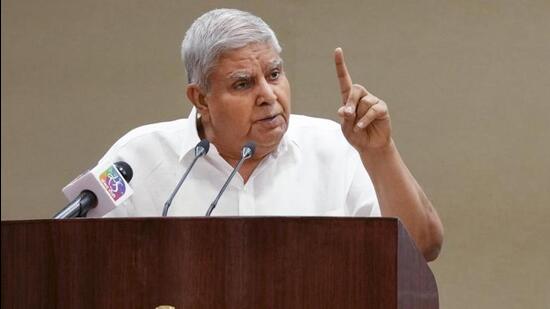The SC had, for the first time, prescribed that the President should decide on the bills reserved for its consideration by the governor within 3 months. Vice President Jagdeep Dhankhar on Thursday expressed concerns over the recent Supreme Court judgement prescribing a timeline for Presidents to sign bills sent by the states and voiced his worries about the judiciary performing executive functions and acting as “super Parliament”.
“There is a directive to the President by a recent judgement. Where are we heading? What is happening in the country? We have to be extremely sensitive. It is not a question of someone filing a review or not. We never bargained for democracy for this” he said. Referring to the April 8 judgement of the Supreme Court in its ruling in the state of Tamil Nadu versus the governor, Dhankhar said, “… So, we have judges who will legislate, who will perform executive functions, who will act as super Parliament, and absolutely have no accountability because law of the land does not apply to them.”
He went on to say, “We cannot have a situation where you direct the President of India and on what basis? The only right you have under the Constitution is to interpret the Constitution under Article 145(3) … The judges who issued a mandamus virtually to the President and presented a scenario it will be law of the land, have forgotten the power of the Constitution. How can that combination of judges deal with something under Article145(3) if preserved it was then for five out of eight.”
The VP said there is a need to amend the provisions of Article 145(3).
“Five out of eight would mean interpretation will be by majority. Well, five constitutes more than the majority in eight. But leave that aside. Article 142 has become a nuclear missile against democratic forces, available to judiciary 24×7”, he added. Addressing the 6th batch of Rajya Sabha interns at the Vice-President’s Enclave, he referred to the incident of cash which was allegedly found in the residence of a sitting Delhi high court judge, Justice Yashwant Varma. The judge has since been de-rostered, and the Supreme Court has ordered a probe.
“An event happened on the night of 14th and 15th of March in New Delhi, at the residence of a judge. For seven days, no one knew about it. We have to ask questions to ourselves. Is the delay explainable? Condonable? Does it not raise certain fundamental questions? In any ordinary situation, and ordinary situations define rule of law — things would have been different,” he said.
The VP who has in the past underlined the need for ensuring judicial accountability said the input about the case from “authoritative source, the Supreme Court of India” “indicated culpability” but now the nation waits with bated breath.
“The nation is restive because one of our institutions, to which people have looked up always with highest respect and deference, was put in the dock,” he said.
He went on to add that no, “investigation under law is in progress at the moment” as no first information report (FIR) has been filed as the law says for FIRs against judges cannot be straightaway registered.
“It has to be approved by the concerned in judiciary but that is not given in the Constitution. Constitution of India has accorded immunity from prosecution only to the President and the Governors. So, how come a category beyond law has secured this immunity?” he said.



